
Frequency is a 2001 rhythm game developed by Harmonix and published by Sony Computer Entertainment for the PlayStation 2. It was released on November 20, 2001.

Amplitude is a 2003 rhythm game developed by Harmonix and published by Sony Computer Entertainment for the PlayStation 2. It is the sequel to Frequency (2001). The game was released in 2003 for North America on March 25 and for Europe on September 26.
Harmonix Music Systems, Inc., doing business as Harmonix, is an American video game developer company based in Boston, Massachusetts. The company was established in May 1995 by Alex Rigopulos and Eran Egozy. Harmonix is perhaps best known as being the developer of music video games series Dance Central and Rock Band, as well as being the original developer and creator of the Guitar Hero series before development moved to Neversoft and Vicarious Visions.
Kasson Crooker is an American electronic musician, a composer, and the artist behind Symbion Project, his solo moniker. His past bands are Freezepop, Splashdown, Larkspur, and Sirensong. DJ HMX, Komputer Kontroller, and Cosmonaut Zero were alias bands of Crooker used only for the videogames FreQuency and Amplitude.
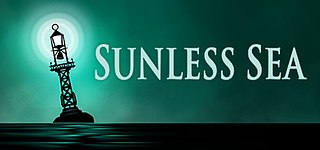
Sunless Sea is a survival/exploration role-playing video game with roguelike elements developed by Failbetter Games. The game was released on 6 February 2015 for Windows and OS X following a successful Kickstarter campaign to crowdfund the project. The game takes place in the universe of Failbetter's browser adventure game Fallen London, in which Victorian-era London has been moved beneath the Earth's surface to the edge of the Unterzee, a vast underground ocean. On 11 October 2016, the game's first downloadable content Zubmariner was released, which allows players to explore beneath the surface of the "zee". A sequel, Sunless Skies, was announced in September 2016. It surpassed its funding goals on Kickstarter and was released on 31 January 2019.

Street Fighter V is a 2.5D fighting game developed by Capcom and Dimps and published by Capcom for PlayStation 4 and Windows in 2016. An arcade version exclusive to Japan was released by Taito in 2019.
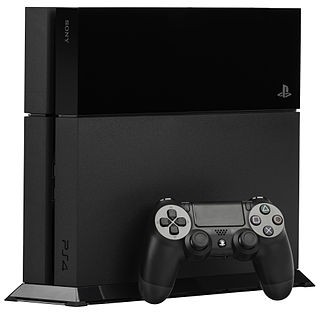
The PlayStation 4 (PS4) is a home video game console developed by Sony Interactive Entertainment. Announced as the successor to the PlayStation 3 in February 2013, it was launched on November 15, 2013, in North America, November 29, 2013, in Europe, South America, and Australia, and on February 22, 2014, in Japan. A console of the eighth generation, it competes with Microsoft's Xbox One and Nintendo's Wii U and Switch.

Sportsfriends is a party video game created by the Danish independent developer collective Die Gute Fabrik. It consists of four games: Johann Sebastian Joust, Super Pole Riders, BaraBariBall, and Hokra. Planned for release on the PlayStation 3, PlayStation 4, Windows, Mac, and Linux, the game was funded through Kickstarter and received over US$150,000 from backers.
Galak-Z: The Dimensional is a shooter video game developed and published by 17-Bit. It was released in August 2015 for the PlayStation 4 and October 2015 for Microsoft Windows, macOS and Linux. A Nintendo Switch port, subtitled Deluxe Edition, was released in March 2019 by Golem Entertainment. It was announced during Sony's pre-E3 2013 press conference in June 2013. 17-Bit CEO Jake Kazdal describes it as "modern Halo and Far Cry 3 combat in a 2-dimensional shell." Reflecting its inspiration in part by Japanese anime, the game is also known officially by the Japanese title of Uchuu Senshi Galak-Z.
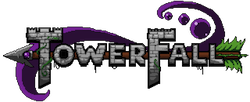
TowerFall is an action indie video game created by Maddy Thorson through her company Maddy Makes Games. In the game, players control up to four archers in a multiplayer platform fighter. It was released on the Ouya microconsole in June 2013 and was later ported to PlayStation 4, Xbox One, Linux, OS X, and Windows as TowerFall Ascension and to the Nintendo Switch under its original title of TowerFall.

H-Hour: World's Elite is a tactical shooter video game, that was developed by SOF Studios. The game released in early access for Microsoft Windows via Steam in May 2015. A version for the PlayStation 4 was planned to be released at a later date.
Superhot is an independent first-person shooter (FPS) video game developed and published by Superhot Team. Though the game follows traditional first-person shooter gameplay mechanics, with the player attempting to take out enemy targets using guns and other weapons, time within the game progresses at normal speed only when the player moves; this creates the opportunity for the player to assess their situation in slow motion and respond appropriately, making the gameplay similar to strategy video games. The game is presented in a minimalist art style, with enemies in red and weapons in black, in contrast to the otherwise white and grey environment.

Wreckfest is a racing video game developed by Bugbear Entertainment and published by THQ Nordic. Wreckfest is described as the spiritual successor to the FlatOut series and a cross between FlatOut, Destruction Derby and cult 1989 PC racer Street Rod. A notable feature of the game engine is the use of soft-body damage modelling, which enables location-based damage that affects the driving dynamics of vehicles in a realistic fashion.

Dragon Fin Soup is a role-playing video game created by the independent development studio Grimm Bros. It is the studio's first title and was released on Microsoft Windows, PlayStation 4, PlayStation 3, and PlayStation Vita. It is influenced by roguelike games and uses procedural generation. The game has two modes: Story mode follows a story and is more like a typical role-playing game, while Survival mode skips the story and focuses on the surviving within the game and constrains players with permadeath—once the player character dies, the game must be restarted from the beginning.

Rock Band 4 is a 2015 rhythm game developed and published by Harmonix. The game was initially distributed by Mad Catz, who also developed new instrument controllers for the game, for PlayStation 4 and Xbox One on October 6, 2015. Performance Designed Products (PDP) took over manufacturing of instrument controllers and distribution of the game by 2016. It is the fourth main installment and the ninth console release in the Rock Band series.
Super Mega Baseball is a baseball video game series developed by the independent studio Metalhead Software in Victoria, BC, Canada and published by EA Sports.

Dreams is a game creation system video game developed by Media Molecule and published by Sony Interactive Entertainment for the PlayStation 4 in February 2020. Players can create and play user-generated content in the forms of games, audiovisual experiences and game assets, which can be shared or remixed to be used in other players' creations.
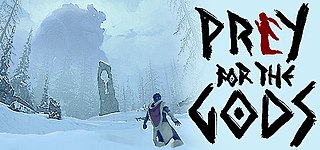
Praey for the Gods is an action-adventure survival game developed by No Matter Studios. Initially released via early access in January 2019, and the full version of the game was released for Microsoft Windows, PlayStation 4, PlayStation 5, and Xbox One in December 2021.

System Shock is a 2023 action-adventure game developed by Nightdive Studios and published by Prime Matter. It is a remake of the 1994 game System Shock by Looking Glass Studios. The game is set aboard a space station in a cyberpunk vision of the year 2072. Assuming the role of a nameless security hacker, the player attempts to hinder the plans of a malevolent artificial intelligence called SHODAN.
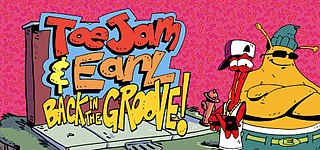
ToeJam & Earl: Back in the Groove is the fourth entry in the ToeJam & Earl series of video games. The game was developed by HumaNature Studios, founded by series creator Greg Johnson, and published by the studio on March 1, 2019.















